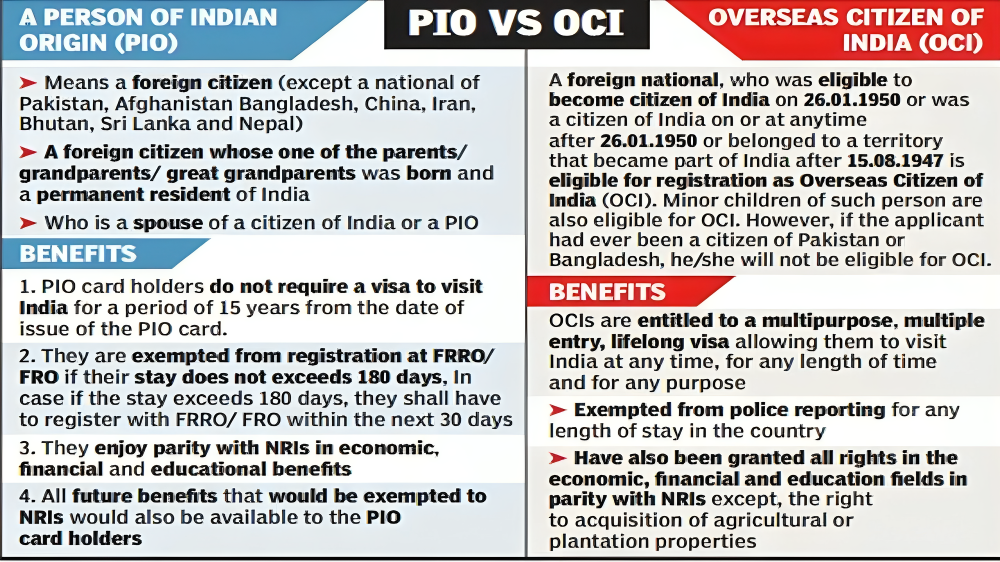Important Facts For Prelims
Overseas Citizenship of India Scheme
- 29 May 2025
- 6 min read
Why in News?
The Indian government has cancelled the Overseas Citizen of India (OCI) registration of a British academic, citing her involvement in anti-India activities through her writings, speeches, and journalistic work at international forums.
What is the Overseas Citizenship of India Scheme?
About
- The OCI scheme was introduced through an amendment to the Citizenship Act, 1955 in the year 2005, that allows foreign citizens of Indian origin to live, work, and travel freely in India without dual citizenship.
- In 2015, the Persons of Indian Origin (PIOs) and OCI categories were merged to streamline documentation and benefits.
- As of 31st January, 2022, 40.68 lakh OCI cards had been issued.
Eligibility
- Eligibility: Foreign nationals (except Pakistan and Bangladesh) who:
- Were citizens of India on or after 26th January, 1950.
- Were eligible to become Indian citizens on 26th January, 1950.
- Belonging to a territory that became part of India after 15th August, 1947.
- Are children, grandchildren, or great-grandchildren of such persons
- Minor children of such individuals or those with one Indian parent.
- Spousal Eligibility: A foreign-origin spouse of an Indian citizen or an existing OCI cardholder is eligible if the marriage has been registered and has subsisted for at least two years preceding the application.
- Ineligible Categories: Individuals who are currently serving or retired from foreign military services are not entitled to receive OCI status.
Benefits
- Visa Privileges: Entitled to a multiple-entry, multi-purpose lifelong visa for visiting India without the need for repeated applications.
- Parity with NRIs: Enjoys parity with Non-Resident Indians (NRIs) in various financial, economic, and educational fields, but cannot acquire agricultural/plantation land in India or adopt Indian children internationally.
- Pathway to Citizenship: Eligible for Indian citizenship under Section 5(1)(g) of the Citizenship Act, 1955 after 5 years as an OCI cardholder, with at least 1 year of residence in India during the last 5 years.
- Pension Scheme Access: Eligible to join the National Pension System (NPS) on equal terms with NRIs for long-term retirement planning.
Limitations and Restrictions of OCI Cardholders
- No Dual Citizenship: OCI should not be interpreted as dual citizenship, as India does not permit dual nationality under its legal framework.
- Political Rights: OCI cardholders are not entitled to voting rights in Indian elections.
- OCI holders are barred from holding constitutional posts such as President (Art. 58), Vice-President (Art. 66), Supreme Court Judge (Art. 124), and High Court Judge (Art. 217).
- Legislative Ineligibility: OCIs are not eligible to become members of the Lok Sabha, Rajya Sabha, or State Legislatures.
- Public Employment Restrictions: Under Article 16 (equality of opportunity in public employment), OCI cardholders cannot hold regular government jobs, except where specifically permitted by the Central Government via special notifications.
- Activity-Based Restrictions: Special permission is mandatory for research, mountaineering, missionary/journalistic work, and travel to Protected or Restricted Areas.
Cancellations
- Cancellations are governed by Section 7D of the Citizenship Act, 1955.
- Grounds for cancellation include fraud or misrepresentation in application, anti-India acts, and violations of conditions under the Citizenship Act, 1955.
Person of Indian Origin (PIO)
- A Person of Indian Origin (PIO) is a foreign citizen (excluding nationals of Pakistan, Afghanistan, Bangladesh, China, Iran, Bhutan, Sri Lanka, and Nepal) who:
- once held an Indian passport
- has ancestry (parents/grandparents/great-grandparents) born and permanently residing in India as defined in Government of India Act, 1935 and other territories that became part of India thereafter or,
- is a spouse of an Indian citizen or PIO.
UPSC Civil Services Examination, Previous Year Question (PYQ)
Prelims
Q. With reference to India, consider the following statements: (2021)
- There is only one citizenship and one domicile.
- A citizen by birth only can become the Head of State.
- A foreigner once granted citizenship cannot be deprived of it under any circumstances.
Which of the statements given above is/are correct?
(a) 1 only
(b) 2 only
(c) 1 and 3
(d) 2 and 3
Ans: (a)







